 Among the focuses of the Proms this summer are the centennials of Elliott Carter and Olivier Messiaen and the eightieth birthday of Karlheinz Stockhausen (due to his death in 2007, the celebration of his birthday was fused with a commemoration of his life’s work). Although the first night concert included the first performance of a Proms commission from Carter, the piano piece Caténaires, he is only represented by three other works, the Oboe Concerto, Night Fantasies, and Soundings, as opposed to eighteen works of Messiaen, several of them, including the opera St. Francis of Assisi, to be played on September 7, major works of considerable length. The Stockhausen celebration included a Stockhausen day on August 2, which included performances of Gruppen and Stimmung, among other pieces, as well as a performance of Punkte on August 22, which was his actual birthday.
Among the focuses of the Proms this summer are the centennials of Elliott Carter and Olivier Messiaen and the eightieth birthday of Karlheinz Stockhausen (due to his death in 2007, the celebration of his birthday was fused with a commemoration of his life’s work). Although the first night concert included the first performance of a Proms commission from Carter, the piano piece Caténaires, he is only represented by three other works, the Oboe Concerto, Night Fantasies, and Soundings, as opposed to eighteen works of Messiaen, several of them, including the opera St. Francis of Assisi, to be played on September 7, major works of considerable length. The Stockhausen celebration included a Stockhausen day on August 2, which included performances of Gruppen and Stimmung, among other pieces, as well as a performance of Punkte on August 22, which was his actual birthday.
Carter’s Soundings, which received its first UK performance on August 18 on a concert by the BBC Scottish Symphony Orchestra, was written in 2005 as a present for Daniel Barenboim when he left the post of music director of the Chicago Symphony Orchestra. Since Carter’s intention was to celebrate Barenboim as a musician who regularly directs performances of Mozart piano concertos in which he is also the soloist, he cast the work for piano and orchestra intending that the piano soloist would also be the conductor. It goes without saying that the rhythmic and ensemble difficulty of Carter’s music is greater that that of Mozart’s, making the realization of the idea of a conductor playing along with the orchestra a challenge. Although there are certainly ways that could have been devised to deal with this problem, Carter chose to side step it altogether by, basically, never having the piano and orchestra play together. The piece begins with a piano solo, there is a short interjection by the orchestra, the piano plays a little bit again, then there’s a long stretch of orchestra music; there is a very brief exchange of single notes on the piano (the notes, D and Bb, being, of course, Barenboim’s initials–in fact, D is also the first note of the piece, and Bb the last), and then the piece ends with a piano solo. In a performance where the soloist and the conductor were the same, the skimpiness of the interaction might not be so noticeable, but in this performance where the piano, moved off to the side of the orchestra, was played by Nicholas Hodges and the conductor was Illan Volkov, it was not only noticeable, but a little strange and unsatisfying. I have to admit that I found myself wondering if Carter charges by the minute for his commissions, and how much he got paid for this one.
Although Carter’s program notes didn’t explain the title, I assume that it probably refers to the practice of using sounds and echos to measure underwater distances. In this case bursts of fast notes, usually in the winds, are answered by sustained notes, usually in the strings, outlining the boundaries of the registers used. Carter is a master, and in Soundings, as in all his other music, both the instrumental lines, which are always wrought in a masterly fashion, and the unfolding of the music through time, are always skillful and elegant. There’s no question of it being anything other than first rate music. However, it is clear that the piece is, to say the least, not one of Carter’s most important or profound works. Virgil Thomson’s comment on the Beethoven Irish folk song arrangements seemed applicable here: it’s like getting a letter from somebody who can really write, about nothing in particular. (more…)
 There’s been a certain amount of breathless reportage about a new study linking personality and musical taste done by Adrian North at the Heriot-Watt University in Edinburgh, UK. It’s hard to be sure where things went awry, but by the time the media got a hold of the results they were badly exaggerated.
There’s been a certain amount of breathless reportage about a new study linking personality and musical taste done by Adrian North at the Heriot-Watt University in Edinburgh, UK. It’s hard to be sure where things went awry, but by the time the media got a hold of the results they were badly exaggerated. How does it sound – a double concerto written by a musician weaned on Beethoven, salsa, Stravinsky and Bulgarian folk music? In short – like nothing else!
How does it sound – a double concerto written by a musician weaned on Beethoven, salsa, Stravinsky and Bulgarian folk music? In short – like nothing else! He’s been on my list for a while now, to make famous (ha ha) as an S21 “click pick”. But before I get the chance to feature him,
He’s been on my list for a while now, to make famous (ha ha) as an S21 “click pick”. But before I get the chance to feature him, 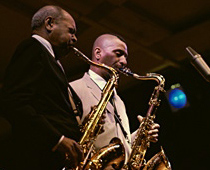
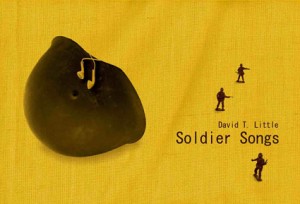
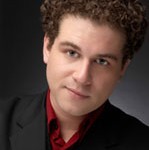
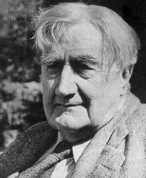 One of the threads of this year’s Proms is a survey of the works of Ralph Vaughan Williams in commemoration of the fiftieth anniversary of his death. On August 26, which was the actual date of his death, the survey climaxed with an all-Vaughan Williams concert by the BBC Symphony, conducted by Sir Andrew Davis. The first work on the concert, the justly celebrated Fantasia on a Theme of Thomas Tallis; its performance, although maybe not exactly peremptory, was certainly restrained and cool, rather than as impassioned as one might have wished it to be. It was followed by the ballet score Job, with whose performance one could not argue. My own feeling about Job is that even though there is much very beautiful music in it, it is a little looser in construction and maybe a little more general in expression that the tightly constructed and closely argued symphonies, and that this is a, for lack of a better word, weakness in the piece.
One of the threads of this year’s Proms is a survey of the works of Ralph Vaughan Williams in commemoration of the fiftieth anniversary of his death. On August 26, which was the actual date of his death, the survey climaxed with an all-Vaughan Williams concert by the BBC Symphony, conducted by Sir Andrew Davis. The first work on the concert, the justly celebrated Fantasia on a Theme of Thomas Tallis; its performance, although maybe not exactly peremptory, was certainly restrained and cool, rather than as impassioned as one might have wished it to be. It was followed by the ballet score Job, with whose performance one could not argue. My own feeling about Job is that even though there is much very beautiful music in it, it is a little looser in construction and maybe a little more general in expression that the tightly constructed and closely argued symphonies, and that this is a, for lack of a better word, weakness in the piece.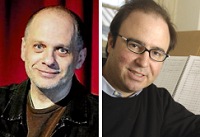 Big Ups to David Lang and Christopher Theofanidis who have just been appointed to the faculty of the Yale School of Music. They will teach graduate students in the school’s composition program as well as teach courses and participate in the performances of their works. Both earned masters and DMA degrees from the Yale School of Music before embarking on their illustrious careers.
Big Ups to David Lang and Christopher Theofanidis who have just been appointed to the faculty of the Yale School of Music. They will teach graduate students in the school’s composition program as well as teach courses and participate in the performances of their works. Both earned masters and DMA degrees from the Yale School of Music before embarking on their illustrious careers.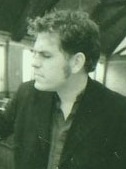 It’s been three years since the human and moral disaster that was Hurricane Katrina overran New Orleans and uncovered an ugly blight on America’s soul. To help make sure that nobody forgets, New Amsterdam Records will release a digital version of Ted Hearne’s powerful work Katrina Ballads on August 29.
It’s been three years since the human and moral disaster that was Hurricane Katrina overran New Orleans and uncovered an ugly blight on America’s soul. To help make sure that nobody forgets, New Amsterdam Records will release a digital version of Ted Hearne’s powerful work Katrina Ballads on August 29. Among the focuses of the Proms this summer are the centennials of Elliott Carter and Olivier Messiaen and the eightieth birthday of Karlheinz Stockhausen (due to his death in 2007, the celebration of his birthday was fused with a commemoration of his life’s work). Although the first night concert included the first performance of a Proms commission from Carter, the piano piece Caténaires, he is only represented by three other works, the Oboe Concerto, Night Fantasies, and Soundings, as opposed to eighteen works of Messiaen, several of them, including the opera St. Francis of Assisi, to be played on September 7, major works of considerable length. The Stockhausen celebration included a Stockhausen day on August 2, which included performances of Gruppen and Stimmung, among other pieces, as well as a performance of Punkte on August 22, which was his actual birthday.
Among the focuses of the Proms this summer are the centennials of Elliott Carter and Olivier Messiaen and the eightieth birthday of Karlheinz Stockhausen (due to his death in 2007, the celebration of his birthday was fused with a commemoration of his life’s work). Although the first night concert included the first performance of a Proms commission from Carter, the piano piece Caténaires, he is only represented by three other works, the Oboe Concerto, Night Fantasies, and Soundings, as opposed to eighteen works of Messiaen, several of them, including the opera St. Francis of Assisi, to be played on September 7, major works of considerable length. The Stockhausen celebration included a Stockhausen day on August 2, which included performances of Gruppen and Stimmung, among other pieces, as well as a performance of Punkte on August 22, which was his actual birthday.